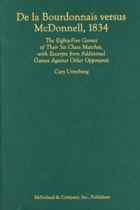De La Bourdonnais Versus Mcdonnell, 1834
Cary Utterberg

There is a simple fact about chess book publishing: most books have a very short shelf life (especially opening books), and books on chess history are guaranteed money losers. I was, of course, acutely aware of this when I wrote Benkos Life, Games, And Compositions. Nevertheless, chess history is a major component of the true chess experience, and just because most players nowadays ignore it doesnt mean such books shouldnt be written indeed, in my opinion they must be written.
While Garry Kasparovs Great Predecessor series has done a lot to introduce a new generation to the wonders of past chess adventures/heroes, McFarland & Company has quietly been churning out very high quality books on a number of historical chess topics. The present book, De La Bourdonnais Versus Mcdonnell, 1834, can easily be summed up just by printing its subtitle: The Eighty-Five Games of Their Six Chess Matches, with Excerpts from Additional Games Against Other Opponents. Whew! That was a mouthful.
The uneducated (and therefore deprived) player might ask, “Who in the hell is De la Bourdonnais? And McDonnell sounds like someone who owned a farm. And why should I look at patzer games from the early 1800s?
Fair questions! Lets first address the reference to “patzer games. Ive looked at all 85 games from this match, and all of them are fascinating battles full of instructive moments. Many others are shockingly modern, and its no surprise that Morphy considered them to be the finest examples of quality chess existing at that time.
But the games are not the sole reason to buy such a book. Instead, you have to look at such a work as a time portal a window into the past that brings to life a different culture, an alien mindset, and a romantic age where chess was something almost mystical and highly artistic (a far cry from the present, when chess is nothing more than Xs and 0s on a computer chip, and chess competition for many people is 1 minute games where hanging pieces has little importance time and a quick interface being the factors that blur the differences between people with skill and people with fast hands and a healthy dose of delusion).
The introduction starts on page 7, and opens in this manner: “Let us spend a summer day wandering about the streets of Paris in the year 1815. The next 35 pages whisk us away to the demise of Napoleon, leads us through a Paris polluted with sewage, and eventually lets us rest in the legendary Café de la Regence, home to the greatest players of the day (not to mention guests like Voltaire, Rousseau, Robespierre, Ben Franklin, and Napoleon). Its in the introduction that we learn how Bourdonnais gained his enormous chess strength, and how the match with McDonnell eventually came to pass.
This is great stuff, but juicy content doesnt stop there. Once the games begin, the author gives us an introduction to each match (played more or less consecutively), and then goes a step further by nicely annotating each and every game.
The rest of the book is filled with the statistics of the enormous event (nobody before or since was crazy enough to play an 85 game match ultimately, the energy spent to complete this contest effectively killed both combatants!) and various interesting appendixes (Selected de la Bourdonnais games against other opponents, Selected McDonnell games against other opponents, Opening theory, then and now, Collected Games of Deschapelles, and more Statistical data).
This is a wonderful book that deserves to be in the collection of every true chess aficionado. I highly recommend it!
